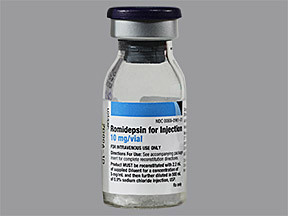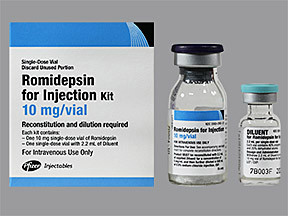ROMIDEPSIN - INJECTION
PHONETIC PRONUNCIATION: (ROE-mi-DEP-sin)
COMMON BRAND NAME(S): Istodax
GENERIC NAME(S): romidepsin
Uses
USES: Romidepsin is used to treat certain types of cancer (cutaneous or peripheral T-cell lymphoma). Romidepsin works by stopping the growth of cancer cells.
How to use ROMIDEPSIN - INJECTION
HOW TO USE: Read the Patient Information Leaflet if available from your pharmacist before your first romidepsin treatment and each time you get another dose. If you have any questions regarding the information, ask your doctor or pharmacist. This medication is mixed in a solution and given slowly into a vein over 4 hours by a health care professional as directed by your doctor. It is usually given on day 1, day 8, and day 15, every 28 days. The dosage is based on your medical condition, body size, and response to treatment. Before each cycle, you should have blood tests to find the best dose for you and to see whether you need to wait before receiving this drug again.
Side Effects
Precautions
Interactions
Overdose
Images
Reviews
Faq for ROMIDEPSIN - INJECTION
Romidepsin injection is used to treat certain types of cutaneous T-cell lymphoma (CTCL) in patients who have received at least one prior systemic therapy.
Romidepsin works by inhibiting enzymes called histone deacetylases (HDACs), which are involved in the regulation of gene expression. This helps to control the growth and division of cancer cells.
Romidepsin is administered as an intravenous (IV) infusion by a healthcare professional. The infusion is usually given once a week for three weeks in a 28-day treatment cycle.
Common side effects may include fatigue, nausea, vomiting, diarrhea, loss of appetite, and skin reactions such as rash or itching. It is important to report any severe or persistent side effects to your healthcare provider.
Before starting romidepsin, inform your doctor about any medical conditions you have, including liver or kidney problems. It may also interact with other medications, so provide a list of all the drugs you are taking. Romidepsin should not be used during pregnancy as it may harm the unborn baby.
Treatment with romidepsin is typically continued until the disease progresses or unacceptable toxicity occurs. The duration of treatment may vary for each individual and should be discussed with your healthcare provider.
The safety and effectiveness of romidepsin in pediatric patients have not been established, so it is generally not recommended for use in children.
Romidepsin can provide significant improvement in the symptoms and overall survival of CTCL patients, but it may not cure the disease entirely. It is important to follow your doctor's instructions and continue regular check-ups even after treatment.
Romidepsin is often used as a second-line or later therapy for CTCL. It may be used alone or in combination with other treatments, depending on the individual patient's condition.
Disclaimer
IMPORTANT: HOW TO USE THIS INFORMATION: This is a summary and does NOT have all possible information about this product. This information does not assure that this product is safe, effective, or appropriate for you. This information is not individual medical advice and does not substitute for the advice of your health care professional. Always ask your health care professional for complete information about this product and your specific health needs.



No Reviews Yet